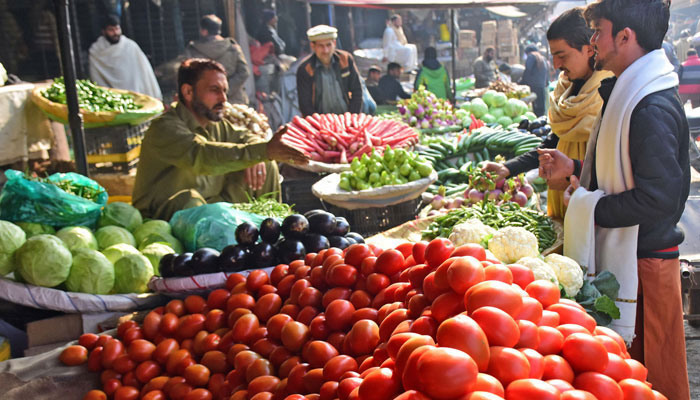Inflation and unemployment
LAHORE: While nominal wages in Pakistan have increased, high inflation has eroded workers’ purchasing power, leading to stagnation or a decline in real wages. Rising unemployment has further intensified economic stress.
In recent years, Pakistan has adjusted wages to respond to economic conditions. In the 2024-25 federal budget, the minimum wage was raised from Rs32,000 to Rs37,000 per month, effective July 1, 2024. Government employees in Grades 1 to 16 received a 25 per cent salary increase, while those in Grades 17 to 22 saw a 20 per cent raise.
Despite these measures, economic challenges over the past seven years have worsened employment levels and poverty rates. The International Monetary Fund (IMF) projected Pakistan’s unemployment rate to rise to 8.5 per cent in 2023, up from 6.2 per cent in 2021, adding approximately 1.5 million unemployed individuals in two years. Economic turmoil, natural disasters, and external shocks have exacerbated the crisis, highlighting the urgent need for job creation, economic stabilisation, and social protection policies.
The employment-to-population ratio stood at 47.6 per cent in 2023, nearly two percentage points below pre-crisis levels in 2019, reflecting declining job opportunities. Meanwhile, the World Bank estimated that Pakistan’s lower-middle-income poverty rate reached 40.5 per cent in FY24, with an additional 2.6 million Pakistanis falling below the poverty line due to factors such as Covid-19, the 2022 floods, and macroeconomic instability.
The relationship between unemployment and poverty in Pakistan is complex. While rising joblessness typically leads to increased poverty, other factors -- including inflation, governance issues, and global economic shocks -- also contribute to the problem. A study analysing data from 1984 to 2016 found that poverty in Pakistan responds asymmetrically to changes in unemployment, meaning that rising joblessness has a greater impact on poverty than declining unemployment has on poverty reduction.
To prevent further job losses, Pakistan must adopt a pro-employment approach that balances wage growth with productivity gains while keeping business costs manageable. Wage hikes without corresponding productivity improvements can lead to higher operational costs, job cuts, or inflationary pressure, while stagnant wages reduce workers' purchasing power and weaken economic demand.
A more effective strategy would involve implementing sector-specific, productivity-based wage adjustments instead of arbitrary minimum wage hikes. Encouraging performance-based pay structures, such as profit-sharing and productivity-linked incentives, can help improve efficiency while ensuring workers benefit from economic growth. Expanding training programmes to upskill workers is also essential in enhancing their value and employability.
In addition to wage policies, the government must focus on lowering non-wage costs for businesses by reducing regulatory burdens, offering tax credits for job creation, and improving infrastructure to cut operational expenses.
Providing soft loans and tax incentives for small and medium enterprises that generate employment can further stimulate job growth. Strengthening vocational training centres to align skills development with industry needs, particularly in high-demand sectors like IT, engineering and renewable energy, would help bridge the gap between education and employment. Investing in labour-intensive industries such as construction, agriculture, and light manufacturing could create immediate job opportunities, while developing export-oriented sectors, tourism, and services would further expand employment prospects. By adopting cost-effective, pro-employment policies, Pakistan can stabilise its labour market, mitigate poverty and sustain business viability in a challenging economic environment.
-
 King Charles Speaks Out Over Andrew's Scandal: 'Stand Ready To Help Police'
King Charles Speaks Out Over Andrew's Scandal: 'Stand Ready To Help Police' -
 Dax Shepard Recalls Horrifying Accident That Almost Killed Him
Dax Shepard Recalls Horrifying Accident That Almost Killed Him -
 Logan Paul's Bodyguard Hits Fan On Super Bowl Day
Logan Paul's Bodyguard Hits Fan On Super Bowl Day -
 Epstein Files: Anne Hathaway Mentioned As Highly Desired Guest For Bill Gates?
Epstein Files: Anne Hathaway Mentioned As Highly Desired Guest For Bill Gates? -
 Prince Harry Under A Lot Of Stress As Meghan Markle Makes Bizarre Demands
Prince Harry Under A Lot Of Stress As Meghan Markle Makes Bizarre Demands -
 Princess Beatrice, Eugenie's Subtle Break From Disgraced Parents Exposed
Princess Beatrice, Eugenie's Subtle Break From Disgraced Parents Exposed -
 Baby Left In Running Bathtub Dies After Father ‘forgets’ Him
Baby Left In Running Bathtub Dies After Father ‘forgets’ Him -
 King Charles Takes A Major Step To Keep Horrified Prince William Out Of The Loop On Andrew: Insider
King Charles Takes A Major Step To Keep Horrified Prince William Out Of The Loop On Andrew: Insider -
 Taylor Swift Set To Make Biggest Cut From Her Wedding Guest: Blake Lively Or Ryan Reynolds
Taylor Swift Set To Make Biggest Cut From Her Wedding Guest: Blake Lively Or Ryan Reynolds -
 Prince William Meets Saudi Crown Prince Mohammed Bin Salman
Prince William Meets Saudi Crown Prince Mohammed Bin Salman -
 Brooklyn Beckham Brutally Cuts Off Inner Circle Amid Feud With David, Victoria
Brooklyn Beckham Brutally Cuts Off Inner Circle Amid Feud With David, Victoria -
 Kaley Cuoco Reveals Why Fiance Tom Pelphrey Sleeps In Seperate Room
Kaley Cuoco Reveals Why Fiance Tom Pelphrey Sleeps In Seperate Room -
 Ghislaine Maxwell Will Not Answer Congress Questions On Epstein
Ghislaine Maxwell Will Not Answer Congress Questions On Epstein -
 Kensington Palace Announces Prince William's Arrival In Saudi Arabia
Kensington Palace Announces Prince William's Arrival In Saudi Arabia -
 ‘Andrew Crisis Follows King Charles Everywhere Now’
‘Andrew Crisis Follows King Charles Everywhere Now’ -
 Jennifer Aniston Already Decided Her Wedding Dress?
Jennifer Aniston Already Decided Her Wedding Dress?




